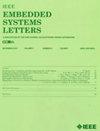通过 Memristive Crossbar 阵列中基于 PUF 的密钥管理确保二值化神经网络的安全
IF 1.7
4区 计算机科学
Q3 COMPUTER SCIENCE, HARDWARE & ARCHITECTURE
引用次数: 0
摘要
本文章由计算机程序翻译,如有差异,请以英文原文为准。
Securing Binarized Neural Networks via PUF-Based Key Management in Memristive Crossbar Arrays
Binarized neural networks (BNNs) are a subset of deep neural networks proposed to consume less computational resources with a smaller energy budget. Recent studies showed that memristor-based in-memory computing architectures can be constructed to accelerate BNNs, with better performance compared to traditional CMOS technologies. The memristor nonvolatility utilized for in-memory computing poses a notable threat to theft attacks in the presence of adversaries with physical access. This motivates us to introduce two novel protection methodologies to safeguard the model parameters of BNNs in the memristive crossbar. We propose to take advantage of physical unclonable functions (PUFs), which can be implemented using memristor-based crossbars for protecting BNN. This feature provides superior security compared to the traditional stored-key-based schemes. We provide circuit-level hardware designs to implement our methodologies with negligible additional overhead compared to an unprotected design and detailed supporting analysis to validate our security claims.
求助全文
通过发布文献求助,成功后即可免费获取论文全文。
去求助
来源期刊

IEEE Embedded Systems Letters
Engineering-Control and Systems Engineering
CiteScore
3.30
自引率
0.00%
发文量
65
期刊介绍:
The IEEE Embedded Systems Letters (ESL), provides a forum for rapid dissemination of latest technical advances in embedded systems and related areas in embedded software. The emphasis is on models, methods, and tools that ensure secure, correct, efficient and robust design of embedded systems and their applications.
 求助内容:
求助内容: 应助结果提醒方式:
应助结果提醒方式:


